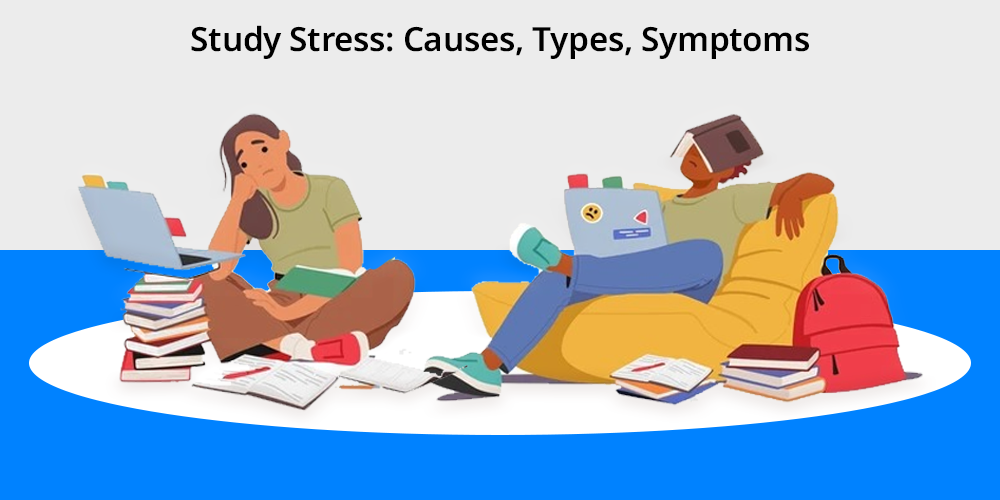
Do you know that study stress is a major cause of concern among young kids?
Study stress is a major problem among the new generation of kids. In this modern world, stress has become a major cause of problems among children and adults. Due to stress, students find it difficult to perform well in their academics, which hinders their true potential of learning.
Students workloads cause stress which makes it hard for them to participate in the teaching and learning process. However, nominal stress is a normal part of every human being, which motivates students to perform well in their academics and daily life.
However, extreme stress causes students to perform poorly in their exams as well as hampers their behavioural health. The main causes of stress are academic pressure, parental pressure, career tension, exam stress, and so on.
Study stress causes anxiety and depression due to which they find it difficult to cope with it. Stress also causes students to indulge in bad habits such as doping, alcoholism, smoking, etc.
Stress management for students is essential in enhancing students mental health and promoting active minds. Study stress also causes various health-related issues that hamper their day to day activities.
Contents
What is Study Stress?
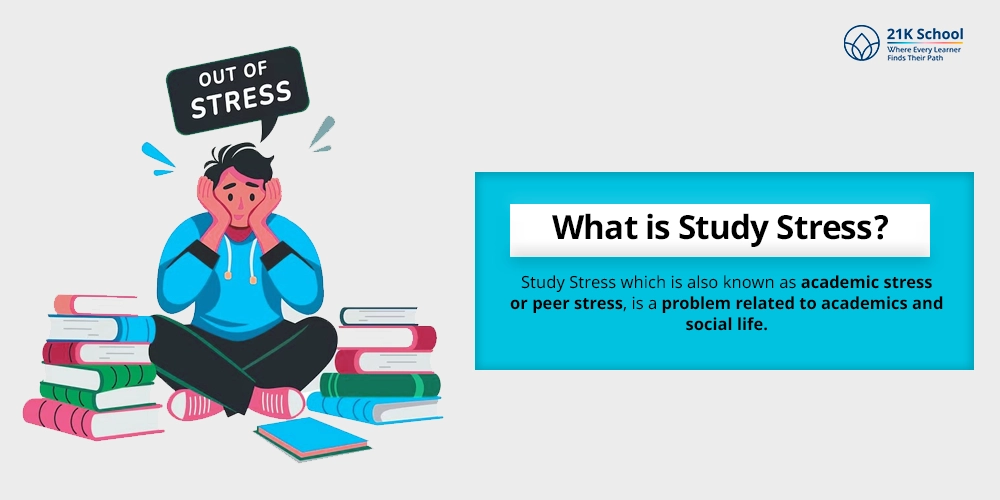
Study Stress which is also known as academic stress or peer stress, is a problem related to academics and social life. Study stress can be understood as the social, emotional and physical reaction to behavioural changes.
It can also be described as a decline in performance due to emotional, social and physical difficulties. Study stress occurs due to exams, improper academic performance, fear of failing, parental pressure, social pressure, career tension and other factors.
Study stress causes students to prevent them from reaching their full potential and from pursuing lifelong learning
However, normal stress is natural and serves as a motivator for all people and excessive stress leads to negativity among students, which leads to doping, alcoholism, hatred and suicidal thoughts as well as negative effects on their mental and physical health.
It is essential that educators and parents foster a supportive learning environment and give students the help and direction they need.
Types of Study Stress
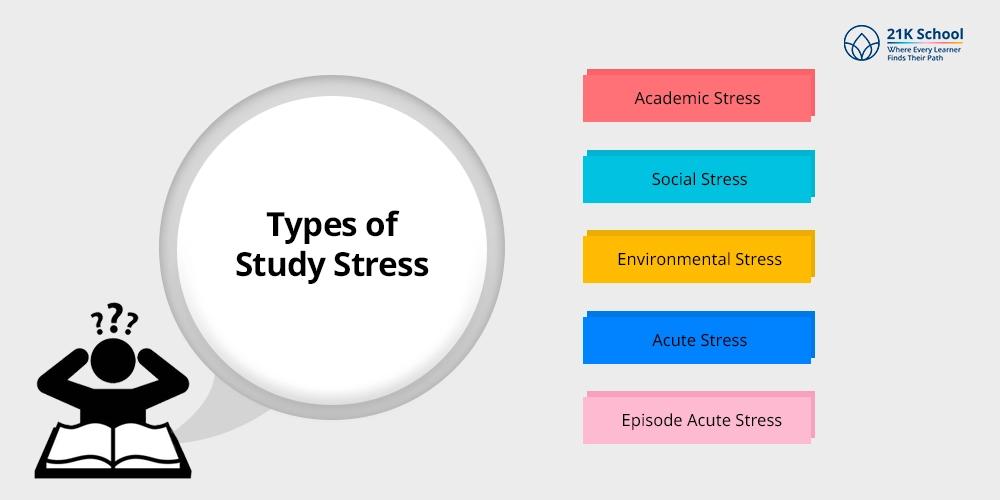
Study stress is a term used to define the cause of stress and anxiety due to academic pressure. Study stress is not limited only to education instead, it has various aspects that can occur due to multiple reasons.
Due to study stress, students find it difficult to adjust to others, which hampers their collaboration skills Every type of stress has different symptoms and can occur due to various reasons.
However, a little stress is essential for individuals who allows them to adjust according to the situation. Here you can check the types of study stress mentioned below.
1. Academic Stress
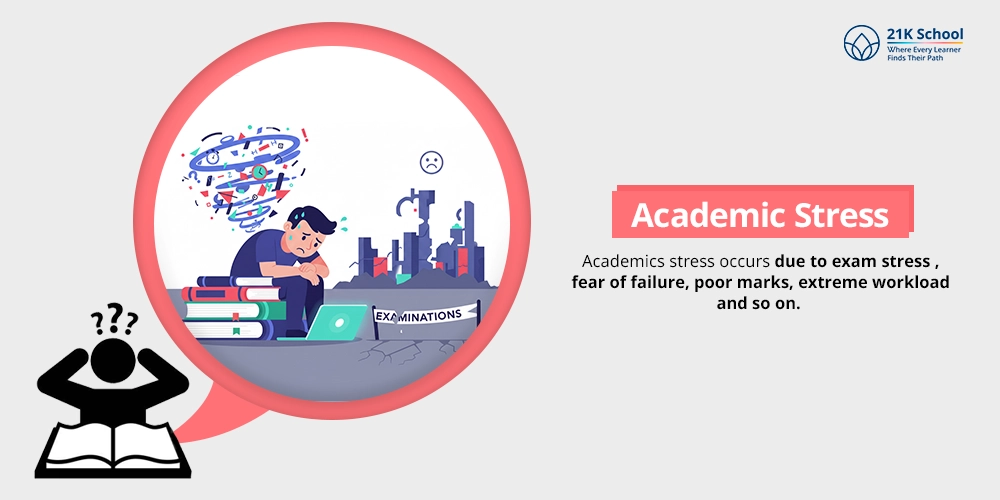
Academic stress is the most common stress among students. Academic stress causes students to perform poorly in their examinations and in real life.
Academics stress occurs due to exam stress , fear of failure, poor marks, extreme workload and so on. This causes students to develop anxiety and stress, and even depression.
2. Social Stress
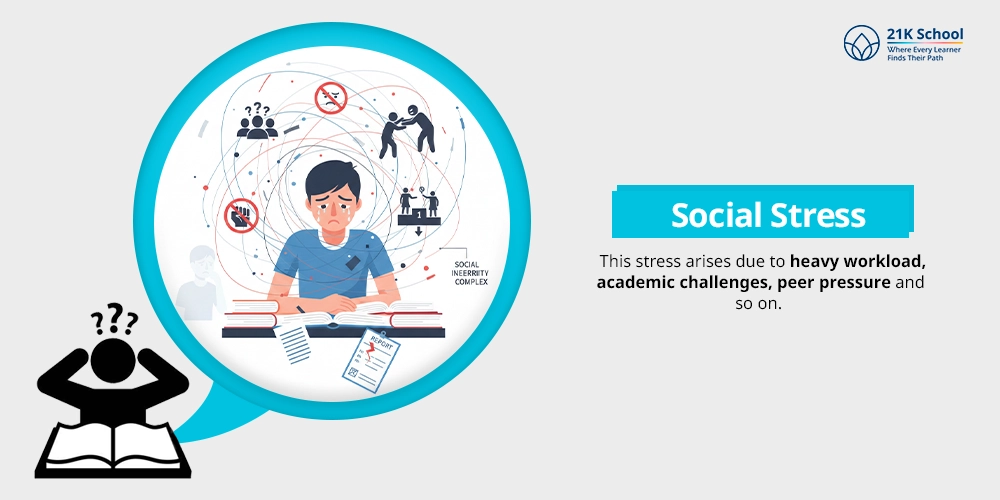
Social stress is a type of stress which occurs due to social factors. This stress arises due to heavy workload, academic challenges, peer pressure and so on.
One of the major reasons for social stress is peer pressure, racism problems in schools, bullying, and peer competition. This causes them to perform badly in their academics as well as develop a social inferiority complex. Due to social stress students become socially isolated and unmotivated.
3. Environmental Stress
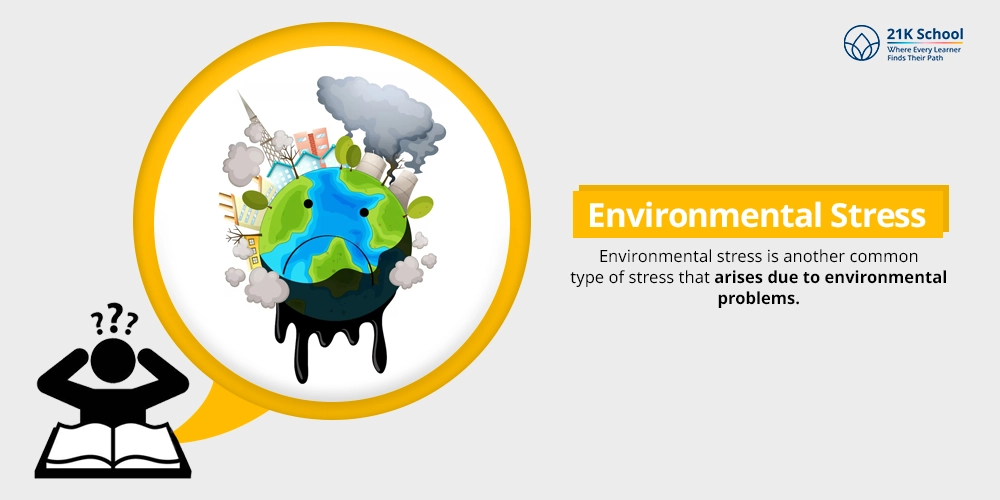
Environmental stress is another common type of stress that arises due to environmental problems. Environmental stress can be short-term and long-term arises due to behavioural consequences.
Environmental stress can occur due to natural calamities or external factors such as earthquakes, noise pollution, water pollution, air pollution, land degradation, excessive temperature and population. Environmental factors make education difficult and hamper their physical surroundings.
4. Acute Stress
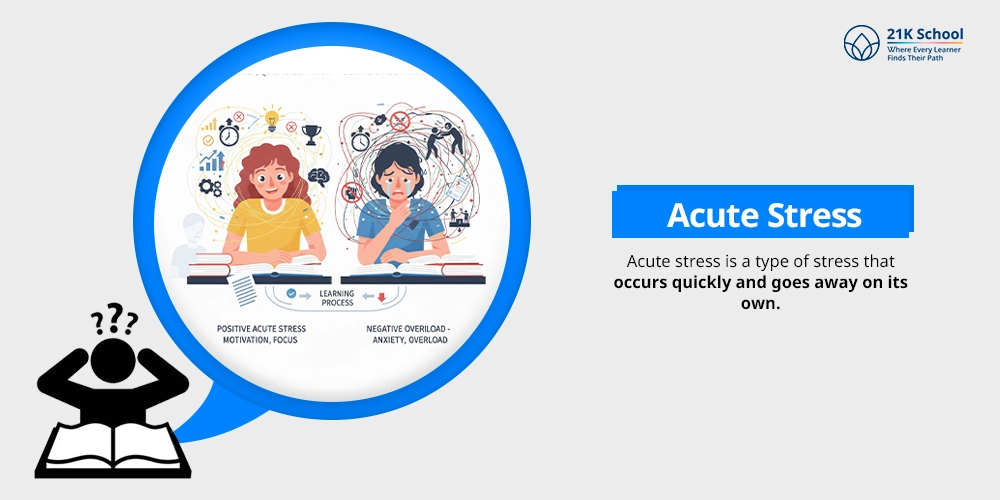
Acute stress is a type of stress that occurs quickly and goes away on its own. Acute stress can be positive as well as negative, which affects the learning process of students.
Acute stress is a two-phase thinking in which individuals find it tough to make decisions. Acute stress is a natural process and faced by most of the students.
5. Episode Acute Stress
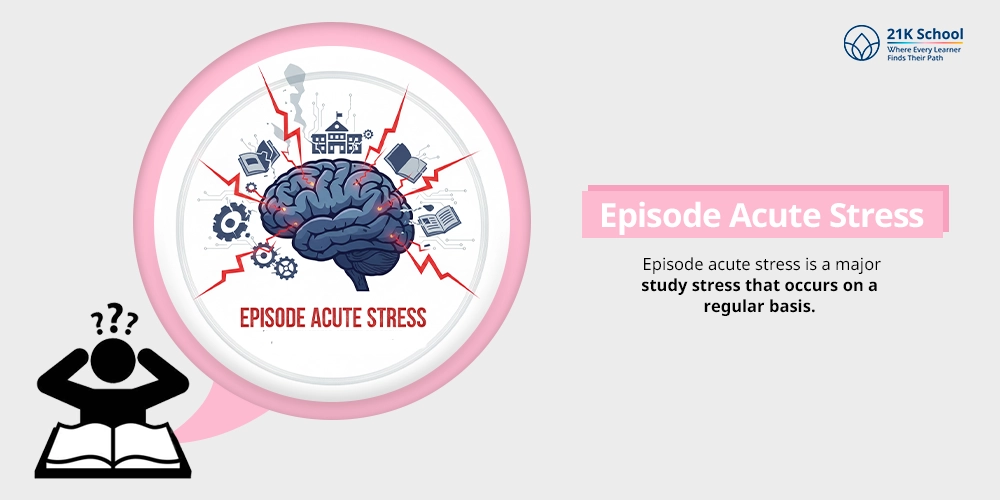
Episode acute stress is a major study stress that occurs on a regular basis. This type of stress affects childrens mental health and their working abilities.
In this type of stress it becomes tough for students to return to a normal state of calmness. Due to this stress students find it difficult to communicate with others and hampers their physical surroundings.
Health Effects of Stress in Students
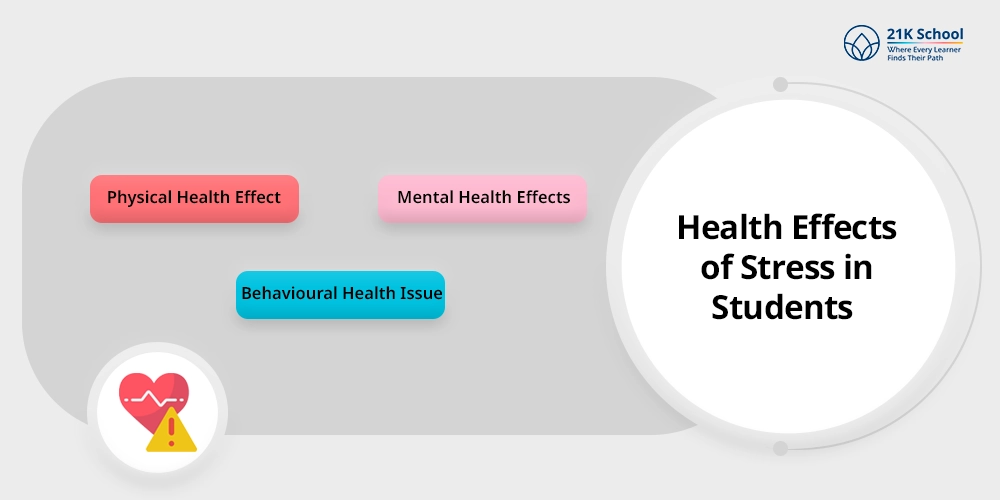
Stress affects both physical and mental health of students, which causes them to perform poorly in their academics. Mental and physical stress hampers students’ performance and learning outcomes.
Stress can be of short-term and long-term, in which short-term stress is a natural part of human beings that goes away on its own and allows them to develop confidence and social skills.
Whereas long-term stress is a major stress that stays for a longer period of time. Stress causes students to develop depression, anxiety, and diseases. Here you can check the health-related issues due to stress among students.
1. Physical Health Effect
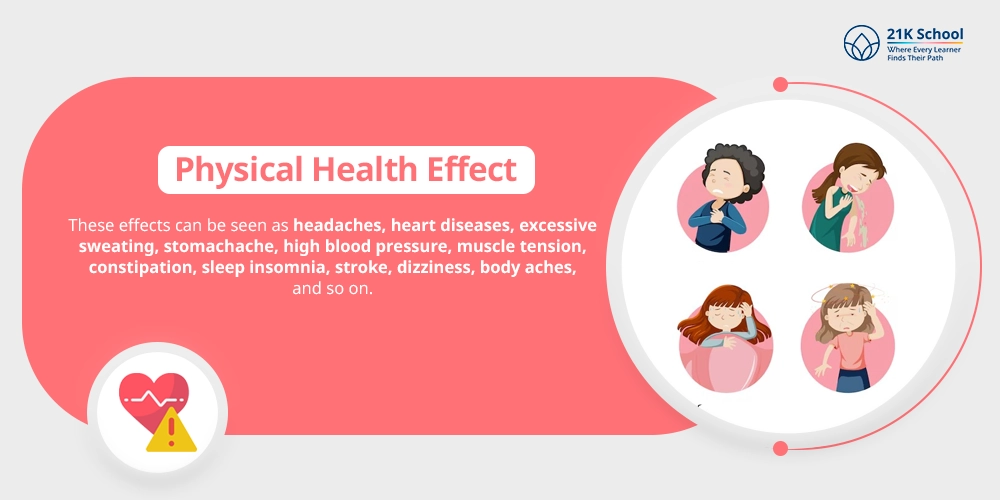
Physical health negatively affects students’ health, as this is a common type of health effect that arises due to study stress.
These effects can be seen as headaches, heart diseases, excessive sweating, stomachache, high blood pressure, muscle tension, constipation, sleep insomnia, stroke, dizziness, body aches, and so on. These are the physical health effects and are mostly seen in young kids and adults.
2. Mental Health Effects
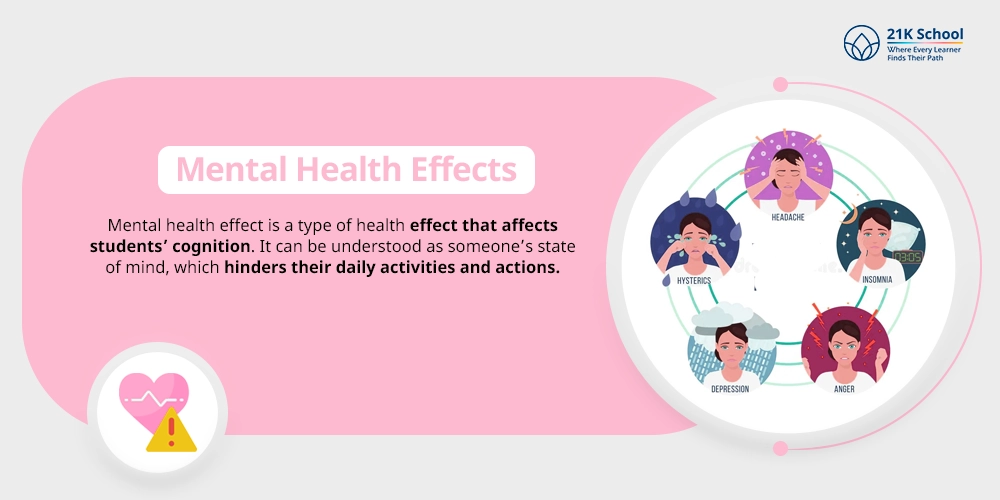
Mental health effect is a type of health effect that affects students’ cognition. It can be understood as someone’s state of mind, which hinders their daily activities and actions. Mental health effects cause students to feel overwhelmed and depressed.
Headaches, lightheadedness, depression, anxiety, mood swings, fatigue, mental shock, brain fog, trauma, concentrating, etc., are the examples of mental health effects.
3. Behavioural Health Issue
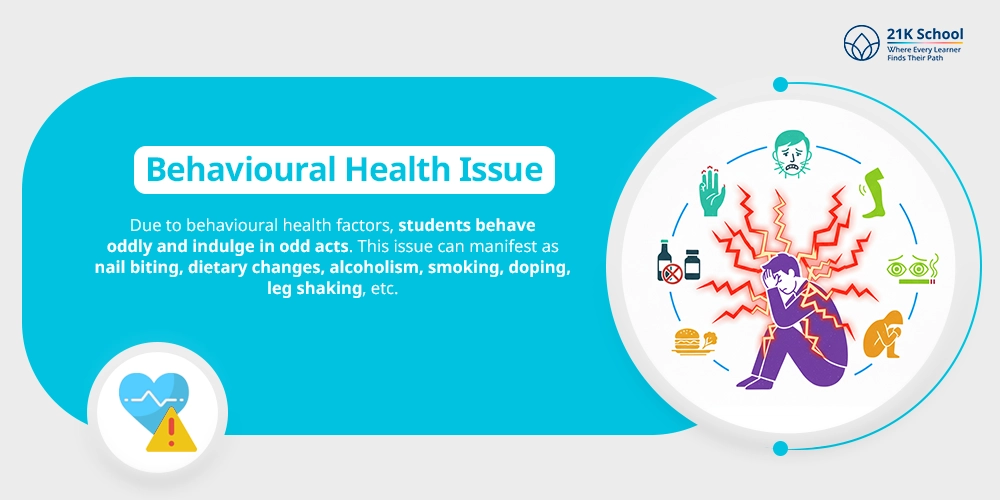
Behavioural health issues hamper the behaviour of students due to study stress. Due to behavioural health factors, students behave oddly and indulge in odd acts. Behavioural issues are the most common issue faced by the maximum number of students and individuals.
This issue can manifest as nail biting, dietary changes, alcoholism, smoking, doping, leg shaking, teeth grinding, restlessness, withdrawal symptoms and more.
Causes of Study Stress
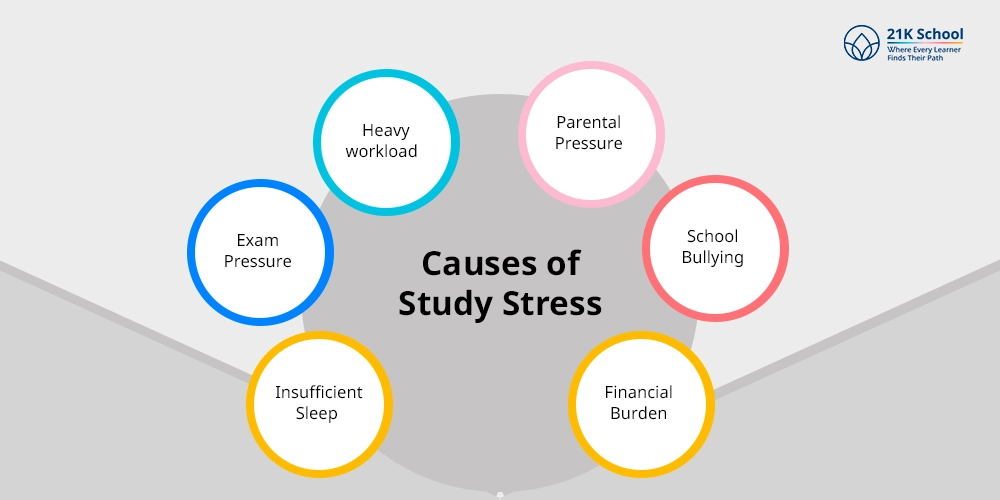
Stress is a major problem among children and it arises due to various reasons and factors. Study stress hampers students academic performance as well as is a major reason for anxiety, depression, and dizziness.
Stress affects students both mentally and physically, which hampers their daily capacity of learning and working. Below are the causes of stress in students that hinders their learning process.
1. Insufficient Sleep
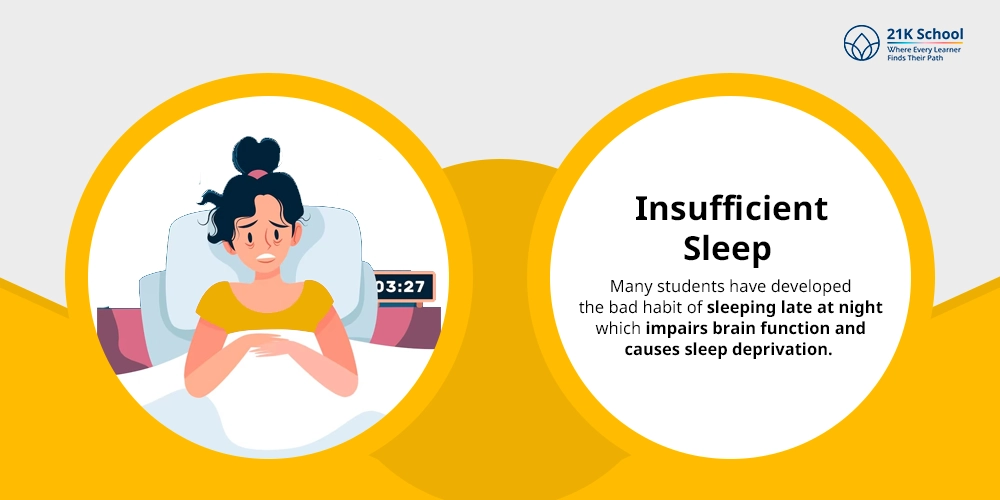
Insufficient sleep is a major cause of stress among children that hinders their learning process. Many students have developed the bad habit of sleeping late at night which impairs brain function and causes sleep deprivation.
Lack of sleep causes children to experience insomnia which affects their ability to participate in class activities.
Sleep disorders and sleep insomnia are the primary sources of stress and anxiety in students. In such scenarios, it is crucial for parents to create a healthy bedtime routine for their children.
2. Exam Pressure
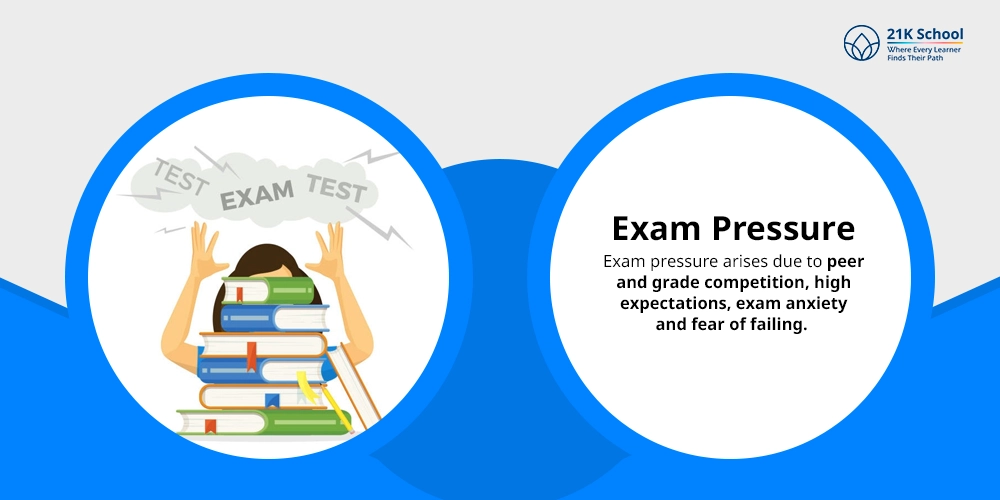
One of the main causes of study stress is exam pressure. Exam pressure arises due to peer and grade competition, high expectations, exam anxiety and fear of failing.
Due to which students experience anxiety and stress particularly during exam season. Academic stress impacts students’ health and negatively impacts their performance. Using virtual learning platforms to take classes also reduces stress.
3. Heavy Workload
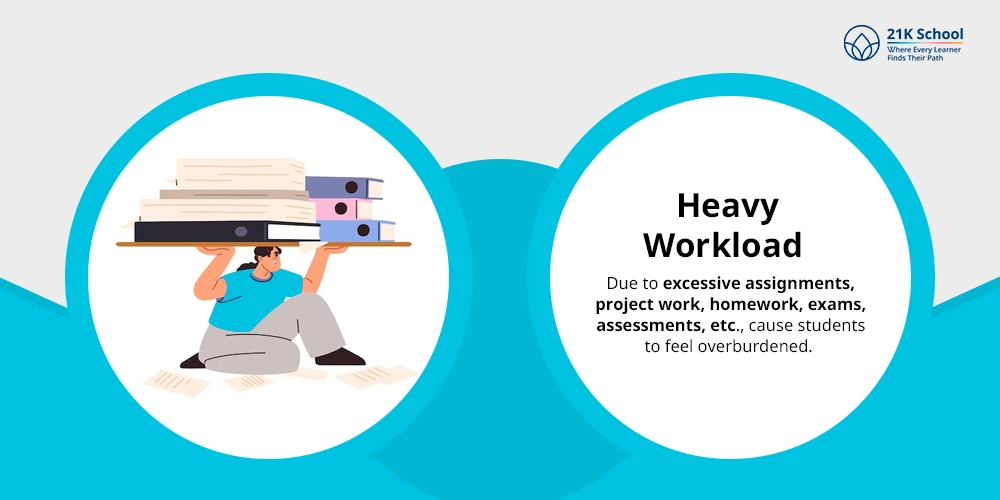
Heavy workload is another factor that causes students stress. Due to excessive assignments, project work, homework, exams, assessments, etc., cause students to feel overburdened.
Extreme workload and meeting tight deadlines cause students to perform poor in their academics and socially. Handling multiple tasks at a time is a stressful process, due to which many students develop anxiety and depression.
4. Parental Pressure
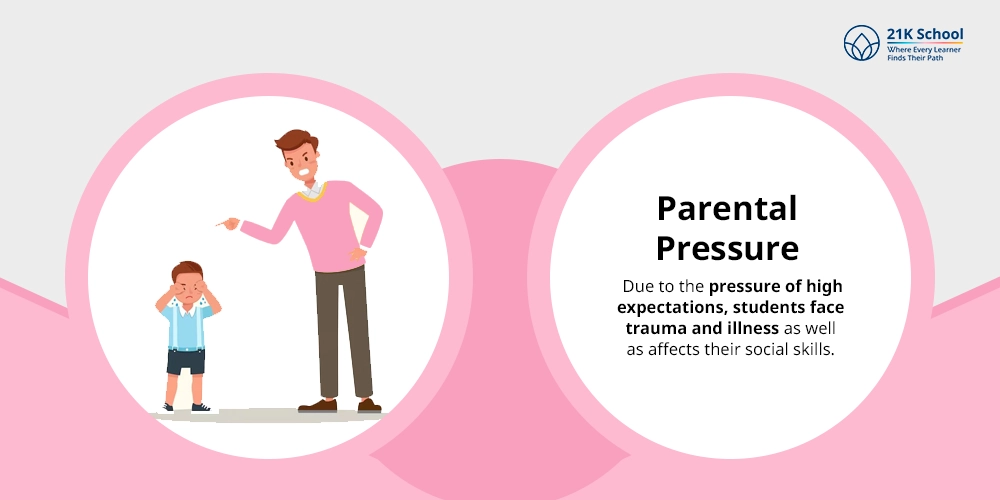
Parental pressure is a major cause of stress among students. Expectations of good marks, achieving the highest grades and performing extremely well in academics cause them to develop depression and extreme stress.
Parents always want the best from their child, and this causes them to put extreme pressure on their studies. Due to the pressure of high expectations, students face trauma and illness as well as affects their social skills.
5. School Bullying

Due to school bullying, students often experience stress. School bullying arises due to various factors such as racial, gender, social or economic discrimination. This causes children to experience stress and anxiety, which hampers their educational and social skills.
Students who face bullying and harassment from their seniors and peers are more likely to develop anxiety and depression. This negatively affects the development of students’ social skills and mental health.
6. Financial Burden

Financial burden or economic constraints are one of the reasons for students’ stress. Due to financial issues, many students are unable to pay their fees, which causes them to drop out.
Due to insufficient resources and education, they feel stressed and depressed. Even many schools have high fees, which are not affordable for everyone, due to which they can’t afford proper tuition or educational resources.
Ways to Overcome Study Stress
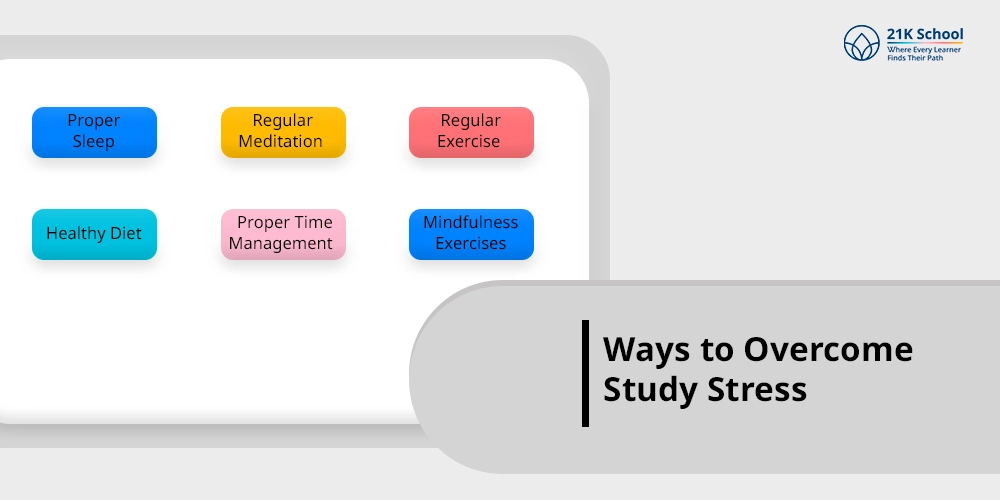
Overcoming stress is very essential for enhancing the learning outcomes of students. Children can overcome their stress through various activities and exercises. Stress hampers students’ performance and makes them socially isolated.
Overcoming stress helps students deal with anxiety and depression while also allowing them to foster a positive learning environment .Here are some strategies to help you get over your study anxiety.
1. Proper Sleep
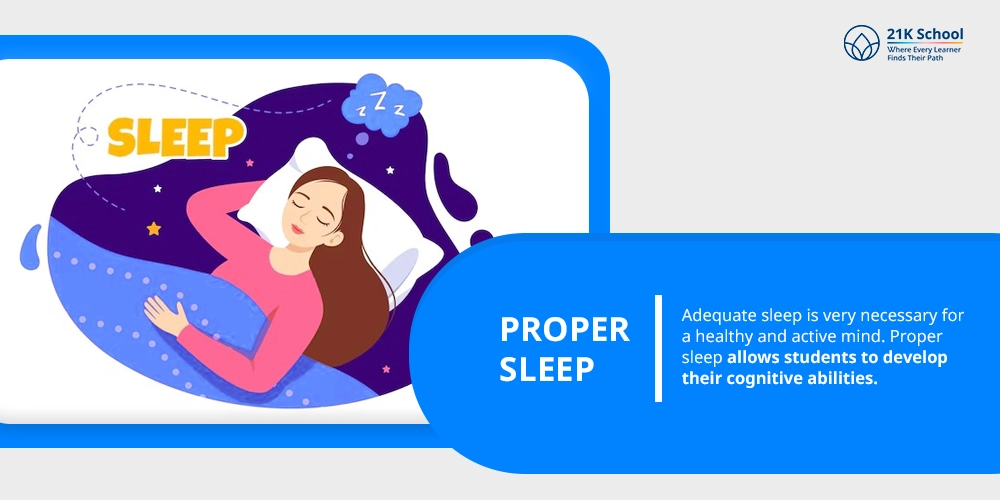
Adequate sleep is very necessary for a healthy and active mind. Proper sleep allows students to develop their cognitive abilities.
Students who sleep less suffer from a number of health issues such as depression, sleep deprivation, insomnia, and other health problems. Improper sleep affects their exam performance and class activities.
Sleep deprivation is the primary cause among young kids due to which they develop anxiety and stress which impairs their performance.
2. Regular Meditation
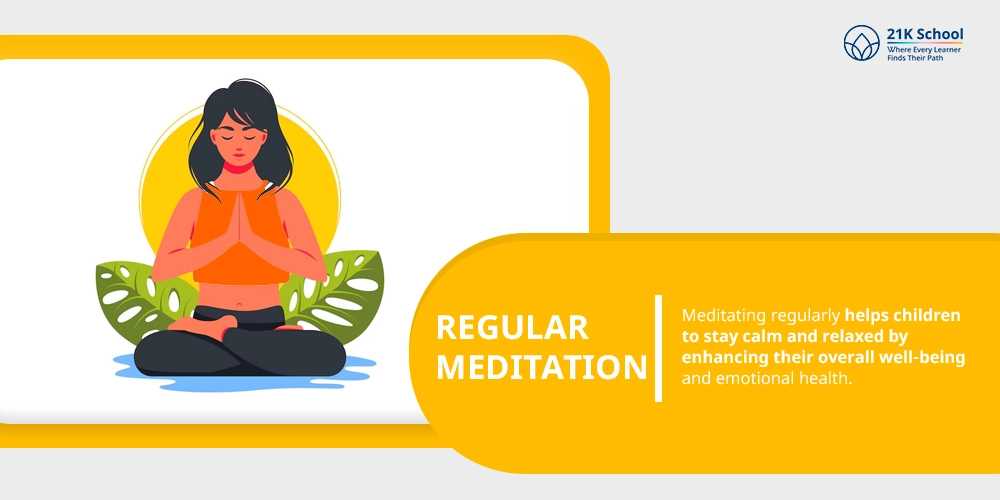
Through practising regular meditation students can experience a significant reduction in stress. Meditating regularly helps children to stay calm and relaxed by enhancing their overall well-being and emotional health.
Meditation fosters social skills development and inner peace. Meditation allows students to enhance their learning outcomes and improve their understanding level.
3. Regular Exercise

Indulging in daily exercise is one of the best ways to deal with stress. Best exercises to get indulge regularly are swimming, jogging, yoga, cycling, gyming, walking, running and so forth.
Daily exercise increases dopamine by releasing endorphins and other hormones, which allows them to stay happy. Students can lessen their stress and anxiety by engaging in regular physical activity.
4. Healthy Diet

Stress and health can be maintained by eating a nutritious, well-balanced diet. Consuming junk food and fatty foods has a negative impact on students’ health and makes them more irritable.
Eating healthy and home-cooked food helps them manage stress and keeps students fit. Children should avoid eating junk food or street food because these foods make them fat and negatively impact their health.
Students who eat poorly are more likely to become aggressive and exhibit behavioural issues.
5. Proper Time Management

Students should utilise their time effectively, through developing time management skills which allows them to become more productive. Children who follow a good study schedule and effectively utilise their time are better able to handle stress and anxiety and lessen the pressure of work.
Inadequate study methods make students anxious and struggle with time management. Students who follow a good study routine are able to manage their stress and study for exams efficiently .
6. Mindfulness Exercises
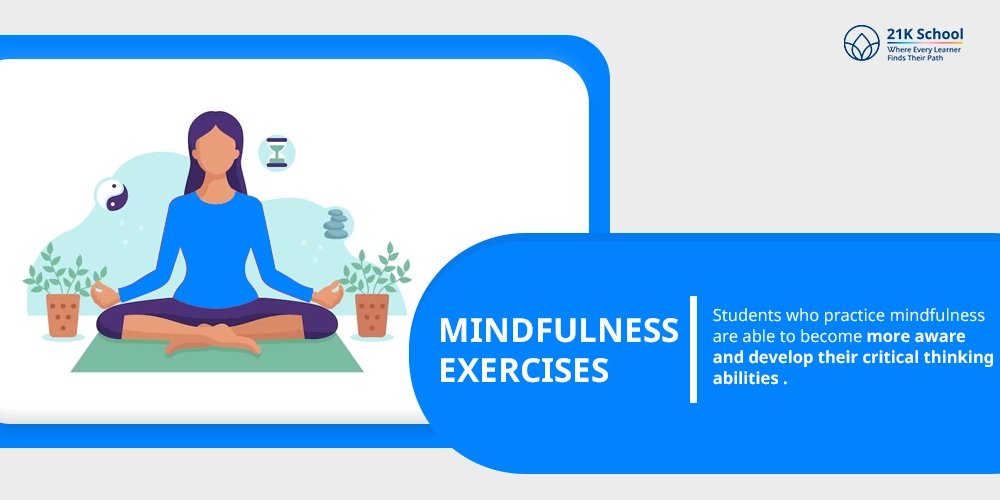
One of the best strategies to lessen stress and anxiety is to practice mindfulness. Students who practice mindfulness are able to become more aware and develop their critical thinking abilities .
Through mindfulness in the classroom students can effectively enhance their sensory effects and encourage holistic education among their peers. This assists students in finding answers to issues and managing their stress in an efficient manner.
Final Note
Students’ academic performance, mental health, and general well-being are all impacted by study stress, which is a major concern. Parental expectations, social challenges and academic pressure are some of the factors that lead to this stress.
Students must be able to identify the symptoms of stress and use healthy coping mechanisms such as getting enough sleep, exercising frequently, being mindful and planning their time well.
Students can improve their academic performance create a supportive learning environment and advance their mental and physical well-being by taking proactive measures to manage students study stress .
In the end, fostering a supportive environment both at home and at school can help students overcome their stressors and realize their full potential.
